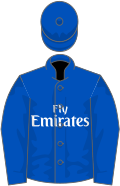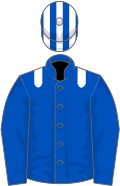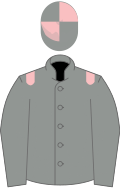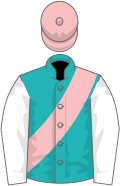Top Qs
Timeline
Chat
Perspective
Doncaster Cup
Flat horse race in Britain From Wikipedia, the free encyclopedia
Remove ads
The Doncaster Cup is a Group 2 flat horse race in Great Britain open to horses aged three years or older. It is run at Doncaster over a distance of 2 miles 1 furlong and 197 yards (3,600 metres), and it is scheduled to take place each year in September.
| 2025 | ||
 |
 |
 |
| Sweet William | Pendragon | Hipop De Loire |
Remove ads
History
The event was established in 1766, and it was originally called the Doncaster Gold Cup. It pre-dates Doncaster's St. Leger Stakes by ten years, and is the venue's oldest surviving race.[1] It was initially held at Cantley Common, and moved to its present location in 1776.
During the early part of its history the race was contested over 4 miles. It was shortened to 2 miles and 5 furlongs in 1825, and reduced to 2 miles and 2 furlongs in 1891. It was cut by another furlong in 1908, and restored to its previous length in 1927.
The present system of race grading was introduced in 1971, and for a period the Doncaster Cup was classed at Group 3 level. It was promoted to Group 2 in 2003.
The Doncaster Cup is one of Britain's leading events for "stayers" – horses which specialise in racing over long distances. It is the final leg of the Stayers' Triple Crown, preceded by the Gold Cup and the Goodwood Cup. The Doncaster Cup is the only British race where the winner has ballot-exempt entry to the Melbourne Cup.[2]
The race is currently held on the third day of Doncaster's four-day St. Leger Festival.
Remove ads
Records
Most successful horse (4 wins):
- Beeswing – 1837, 1840, 1841, 1842
Leading jockey (8 wins):
- Joe Mercer – Nick La Rocca (1953, dead-heat), Grey of Falloden (1964), The Accuser (1968), Biskrah (1972), Sea Anchor (1976), Buckskin (1978), Le Moss (1979, 1980)
- (note: the jockeys of some of the early winners are unknown)
Leading trainer (7 wins):
- Cecil Boyd-Rochfort – Alcazar (1934), Black Devil (1935), Osborne (1954), Atlas (1956), Agreement (1958, 1959), Raise You Ten (1963)
- Sir Henry Cecil – Buckskin (1978), Le Moss (1979, 1980), Ardross (1982), Kneller (1988), Great Marquess (1991), Canon Can (1997)
- (note: the trainers of some of the early winners are unknown)
Remove ads
Winners since 1801
Remove ads
Earlier winners
- 1766: Charlotte
- 1767: Meaburn
- 1768: Laura
- 1769: Tantrum
- 1770: Liberty
- 1771: Mark
- 1772: Mark
- 1773: Forester
- 1774: Juniper
- 1775: Juniper
- 1776: Tuberose
- 1777: Pilot
- 1778: Phocion
- 1779: Magnum Bonum
- 1780: Duchess
- 1781: Crookshanks
- 1782: Crookshanks
- 1783: Faith
- 1784: Phoenomenon
- 1785: Alexander
- 1786: Fairy
- 1787: Stargazer
- 1788: Bustler
- 1789: Tot
- 1790: Abba Thulle
- 1791: Young Traveller
- 1792: Overton
- 1793: Oberon
- 1794: Beningbrough
- 1795: Hambletonian
- 1796: Hambletonian
- 1797: Stamford
- 1798: Stamford
- 1799: Cockfighter
- 1800: Dion
* The 1901 and 1953 races were dead-heats and have joint winners.
Remove ads
See also
- Horse racing in Great Britain
- List of British flat horse races
- Recurring sporting events established in 1766 – this race is included under its original title, Doncaster Gold Cup.
References
External links
Wikiwand - on
Seamless Wikipedia browsing. On steroids.
Remove ads





















































































